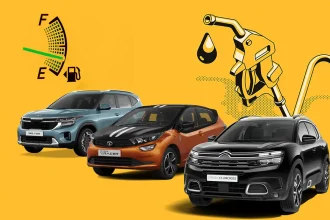Wondering how far your EV can go on a single charge? Whether you’re planning a road trip or just want to avoid range anxiety, our Electric Vehicle Range Calculator helps you calculate how far your electric vehicle can go on a single charge. Need some help? Refer to the quick-use instructions below the tool.
Electric Vehicle Range Calculator
Electric Vehicle Range Calculator
How to Calculate Range in EV Range Calculator
This Electric vehicle range calculator can provide realistic estimates of the electric range of EV cars. It can be useful to verify the range of your current EV or check the range of upcoming EV models.
How to calculate the range of electric vehicles using our calculator? To calculate your range, simply type in the following requirements:
- Battery capacity (in kWh)
- EV energy consumption (in kWh)
- State of charge or SOC
How to Calculate Range of Electric Vehicles Using a Formula
Our calculator is pretty accurate, but you might want to understand the math behind it.
So, how do you calculate EV range? Our calculator uses the formula for calculating electric vehicle range based on SOC to give you accurate results every time.
The electric vehicle range calculation formula you can use is Range = Available Energy ÷ Energy Consumption Rate
Where:
Available Battery Energy (kWh): Battery Capacity × State of Charge (%)
Energy Consumption Rate (kWh/mi or kWh/km): how much energy your EV consumes per mile or kilometer
Let’s use this formula to calculate the EV range of the Hyundai IONIQ 5.
The Hyundai IONIQ 5 has a battery capacity of 72.6 kWh. For this example, let's assume the SOC is 50%. This means that the available energy in the battery is 50% of 72.6, which is 36.3 kWh. The energy consumption rate for the IONIQ 5 is approximately 200 Wh/mi (or 0.2 kWh/mi) based on typical usage.
Using the formula to calculate range of electric vehicles:
Range = Available Energy ÷ Energy Consumption Rate
Range = 36.3 kWh ÷ 0.2 kWh mi
Range = Approximately 181.5 miles
Factors that Affect EV Range Calculations
Calculating a range estimate can be simple, but problems arise when companies try to determine more precise numbers. According to the president of the Australian Electric Vehicle Association, Chris Jones, calculating an EV’s range can be influenced by numerous factors, including battery size, driving conditions, and external environmental factors.
Regarding electric vehicle range calculations, Chris Jones says that it is also influenced by the aerodynamics and weight of the vehicle, as well as the width and size of the tires. Here are some factors that affect EV range calculations:
- Speed
Driving at high speeds may lower your EV range.
- Driving Habits
Aggressive acceleration and braking can reduce EV range.
- Terrain
Driving uphill? Your EV range might take a hit.
- Temperature
The temperature that you’re driving in also impacts the range of electric cars—they are usually less efficient in cold temperatures.
- Climate Control
Interior temperature controls, such as cooling and heating, use energy from the battery, and this results in lower efficiency than that calculated by the EV calculator.
- Battery Condition
EV batteries gradually get less efficient with age and may return a shorter range than when they were new.
Why is the EV Range Calculator Important?
Worried about running out of charge mid-trip? You're not alone—range anxiety is one of the biggest concerns for EV owners. The longer your EV’s range, the fewer charging stops you’ll need, making long drives and road trips more convenient.
Thus, determining EV range has become more important than ever, as it directly affects how long you can drive your EV on a single charge.
If you drive a petrol or diesel vehicle, knowing your mileage is equally important. In these cases, use our car mileage calculator or bike mileage calculator to keep a complete track of your vehicle’s performance.
Frequently Asked Questions
How is the range of an EV calculated?
The EV range of a vehicle is calculated on the basis of driving conditions, including the terrain, weather conditions, and speed. Auto manufacturers use real-time feedback from sensors to estimate range more accurately.
How to calculate the range of an electric vehicle?
You can calculate the range of your EV by dividing the battery capacity by energy consumption.
What are the factors that impact my EV driving range?
Factors such as driving at high speeds, the weather conditions you drive in, your driving habits, where you’re driving, and whether you are using heat or air conditioning can impact the efficiency of your EV.
What is the SOC of an electric car?
State of charge or SOC, in electric vehicle range calculations, represents the percentage of energy currently available in the battery.
What is the formula for range calculation in electric vehicles?
The formula for calculating EV range is battery capacity divided by battery energy consumption.















